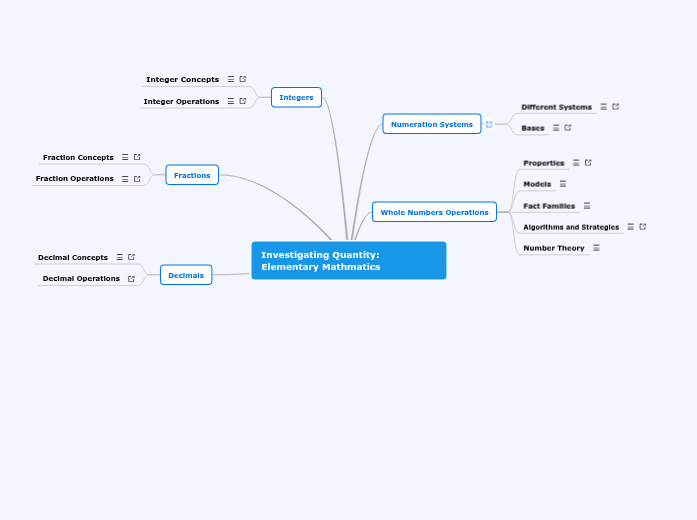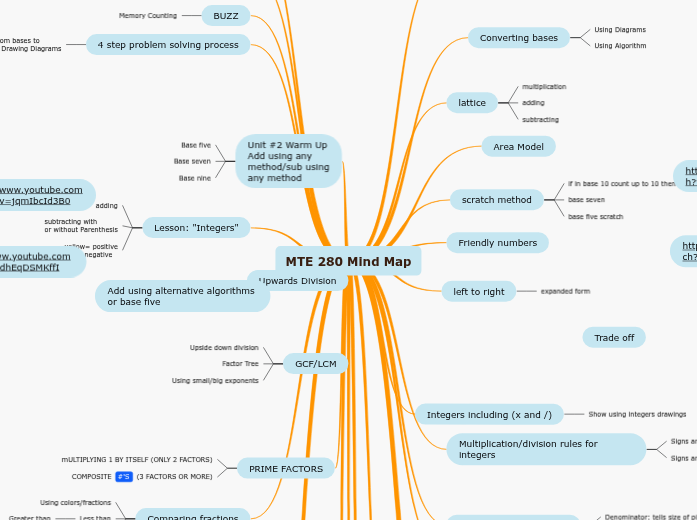Math Help
WORK CITED:
http://www.aaamath.com/
http://www.answers.com
Division
LONG
Place the divisor before the division bracket and place the dividend (4138) under it.
17)4138
Examine the first digit of the dividend(4). It is smaller than 17 so can't be divided by 17 to produce a whole number. Next take the first two digits of the dividend (41) and determine how many 17's it contains. In this case 41 holds two seventeens (2*17=34) but not three (3*17=51). Place the 2 above the division bracket.
2
17)4138
Multiply the 2 by 17 and place the result (34) below the 41 of the dividend.
2
17)4138
34
Draw a line under the 34 and subtract it from 41 (41-34=7). Bring down the 3 from the 4138 and place it to the right of the 7.
2
17)4138
34
73
Divide 73 by 17 and place that answer above the division bracket and to the right of the two.
24
17)4138
34
73
Multiply the 4 of the quotient by the divisor (17) to get 68 and place this below the 73 under the dividend. Subtract 68 from 73 to give an answer of 5. Bring down the 8 from the dividend 4138 and place it next to the 5
24
17)4138
34
73
68
58
Divide 58 by 17 and place that answer (3) above the division bracket and to the right of the four.
243
17)4138
34
73
68
58
Multiply the 3 of the quotient by the divisor (17) to get 51 and place this below the 58 under the dividend. Subtract 51 from 58 to give an answer of 7.
243
17)4138
34
73
68
58
51
7
There are no more digits in the dividend to bring down so the 7 is a remainder. The final answer could be written in several ways.
243 remainder 7 or sometimes 243r7
or as a mixed number 243 7/17
The operation of determining how many times one quantity is contained in another; the inverse of multiplication.
Read more: http://www.answers.com/topic/division#ixzz1B3HBqk7R
EX:
4/2 = 2
Multiplying
How To
MULYIPLYING:
The result of multiplication is the total number (product) that would be obtained by combining several (multiplier) groups of similar size (multiplicand). The same result can be obtained by repeated addition. If we are combining 7 groups with 4 objects in each group, we could arrive at the same answer by addition.
EX:
2*2*2*2 = 2*4 = 8
What is This?
The operation that, for positive integers, consists of adding a number (the multiplicand) to itself a certain number of times. The operation is extended to other real numbers according to the rules governing the multiplicational properties of positive integers.
Read more: http://www.answers.com/topic/multiplication#ixzz1B3EvLGtu
Helpful Math Links and Games
Help
http://www.webmath.com/
Helps Answer questions
http://www.math.com/
Help on topics
http://www.freemathhelp.com/
Math Tut
http://www.mathleague.com/help/help.htm
More help Topics
Games
http://www.coolmath-games.com/
http://www.mathplayground.com/games.html
http://www.aplusmath.com/games/index.html
Fractions
Subtracting Fractions
SUBTRACTING FRACTIONS:
To subtract two fractions with the same denominator, subtract the numerators and place that difference over the common denominator.
EX:
2/5 - 4/5 = 2/5
To Subtract Fractions with different denominators:
Find the Lowest Common Denominator (LCD) of the fractions
Rename the fractions to have the LCD
Subtract the numerators of the fractions
The difference will be the numerator and the LCD will be the denominator of the answer.
Simplify the Fraction
Adding Fractions
HOW TO ADD FRACTIONS:
To add two fractions with the same denominator, add the numerators and place that sum over the common denominator.
EX:
3/10 + 2/10 = 5/10 or 1/2
How to Add Fractions with different denominators:
Find the Least Common Denominator (LCD) of the fractions
Rename the fractions to have the LCD
Add the numerators of the fractions
Simplify the Fraction
EX:
3/9 + 1/3 = 6/9 or 2/3
What Are They?
FRACTIONS:
An expression that indicates the quotient of two quantities, such as 1/3









